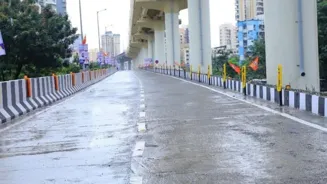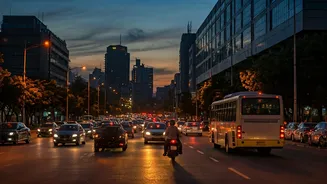The Rs 600-crore Ghodbunder Highway widening project in Thane is facing growing resistance from locals and activists. While the government sees it as a solution to traffic congestion, residents fear it will
worsen safety risks, harm the environment, and was pushed through without proper consultation.
The highway is one of Mumbai’s most important connectors, linking the city with Navi Mumbai, Gujarat, North Maharashtra, and Jawaharlal Nehru Port Trust (JNPT).
But the plan to merge service lanes with the main highway has sparked concern, as it could bring high-speed traffic dangerously close to residential colonies and schools.
The project aims to expand lanes but risks merging service lanes with highway traffic
The expansion plan, approved during Eknath Shinde’s tenure as chief minister, will widen the stretch between Gaimukh and Kapurbawdi to eight lanes. Authorities argue the project will ease traffic flow and reduce long delays.
However, locals and even BJP MLA Sanjay Kelkar claim congestion is temporary and largely due to Metro 4 construction barricades. They say merging service lanes with the highway will endanger lives by removing the buffer zone residents currently use.
Locals are worried about safety and daily inconvenience
Residents say the service lanes are vital for schoolchildren, shoppers, pedestrians, and local traffic to move safely. If they are merged with the main carriageway, locals fear pedestrians and two-wheelers will be forced to share space with speeding trucks and cars, as per the Times of India.
BJP MLA Kelkar has warned that this will lead to more accidents and push residents into taking longer, riskier detours that waste both fuel and time.
Environmental groups highlight large-scale tree cutting
The widening project has already resulted in the felling of thousands of trees along the Ghodbunder stretch. Environmental activists argue this is only part of a much larger pattern in Thane, where projects like the Borivali-Thane Twin Tunnel and Saket-Anand Nagar flyover have been approved with little transparency.
Surveys suggest over 6,500 trees have either been cut or are awaiting clearance since 2022. Protesters insist the authorities are not sharing full information and demand details of compensatory plantations.
Residents oppose the project over the lack of consultation
Many locals argue the project was pushed through without seeking their opinion. Community members and housing societies say they were not informed or consulted before approvals were given.
According to Hindustan Times, political groups such as the Shiv Sena (UBT) have also raised objections, accusing the Mumbai Metropolitan Region Development Authority (MMRDA) of ignoring public sentiment and failing to address the practical concerns of daily commuters.
Can local protests force the authorities to rethink the plan?
Residents are now using multiple strategies to put pressure on authorities. While some are choosing public demonstrations to highlight their anger, others are uniting environmentalists, community leaders, and housing societies to build a stronger case.
Engagement with local politicians has also begun, with Sanjay Kelkar promising to escalate concerns directly to the chief minister.
Whether this collective effort can push the government to revise or pause the project remains to be seen, but the protests show locals are not willing to stay silent.













